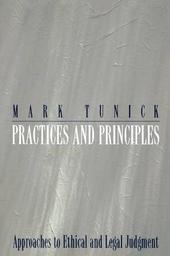
|
Practices and Principles: Approaches to Ethical and Legal Judgment
Paperback / softback
Main Details
| Title |
Practices and Principles: Approaches to Ethical and Legal Judgment
|
| Authors and Contributors |
By (author) Mark Tunick
|
| Physical Properties |
| Format:Paperback / softback | | Pages:256 | | Dimensions(mm): Height 235,Width 152 |
|
| Category/Genre | Ethics and moral philosophy |
|---|
| ISBN/Barcode |
9780691070797
|
| Classifications | Dewey:340.112 |
|---|
| Audience | | Professional & Vocational | | Tertiary Education (US: College) | |
|---|
|
Publishing Details |
| Publisher |
Princeton University Press
|
| Imprint |
Princeton University Press
|
| Publication Date |
10 December 2000 |
| Publication Country |
United States
|
Description
A Japanese woman living in California attempts parent-child suicide, an ancient Japanese custom called "oyako-shinju," in order to rid herself of shame upon learning that her husband has a mistress. She survives, but her two children are drowned in the attempt. Since her attempt was made in accordance with the standards of Japanese culture, should she be tried by the standards and laws of the United States? Are there universally valid moral principles that dictate what is right? Or are moral judgments culturally relative, ultimately dictated by conventions and practices that vary among societies? In Practices and Principles, Mark Tunick takes up the debate between universalists and relativists, and, in political philosophy, between communitarians and liberals, each of which has roots in an earlier debate between Kant and Hegel. Tunick focuses on three case studies: promises, contract law, and the Fourth Amendment issue of privacy. In his analysis, he rejects both uncritical deference to social practice and draconian adherence to principles when making legal and ethical judgments. He argues that we do not always need to choose between abstract principles and social practices.Sometimes we appeal to both; sometimes we need to appeal to shared social norms; and sometimes, where there is no ethical community, we can appeal only to principles. Ultimately, Tunick rejects simplified arguments that force us to choose between either practices or principles, universalism or relativism, and liberalism or communitarianism.
Author Biography
Mark Tunick is Associate Professor of Political Science, The Honors College, at Florida Atlantic University. He is the author of Punishment: Theory and Practice and Hegel's Political Philosophy: Interpreting the Practice of Legal Punishment (Princeton).
Reviews"The central question in this lucid and thoughtful book is, what force do the existence of practices, customs, and traditions have when we make legal and ethical judgments? Tunick's answer is that as much as we need principles to criticize our practices, practices still matter for legal and ethical judgement."--Ethics "Practical and beneficial as a reference for research. As a whole, anyone with strong affection for the area of philosophy will likely enjoy the style and substance offered in Practices and Principles."--New York Law Journal "Tunick ... does a fine job of arguing against those approaches that reify absolute principles and those that rely solely on the justifying power of agreed-upon social practice... The truth, asserts Tunick, lies somewhere in between, in the unresolvable tension that arises when practice and principle collide and transform each other... [Tunick's] writing style is clear and relatively jargon-free... Recommended."--Choice
|